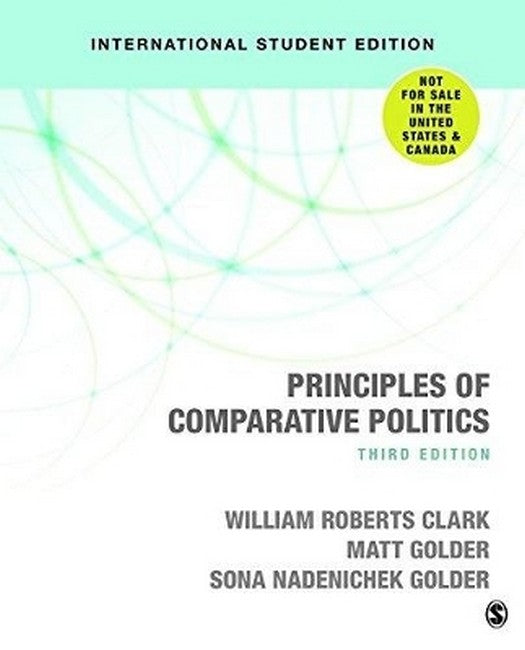William Roberts Clark is associate professor of political science at the University of Michigan. He is the author of Capitalism, Not Globalism, and his articles have appeared in American Political Science Review, Comparative Political Studies, Political Analysis, and European Union Politics, among other journals. He has been teaching at a wide variety of public and private schools (William Paterson College, Rutgers University, Georgia Tech, Princeton, New York University, and the University of Michigan) for over a decade. Matt Golder was previously assistant professor of political science at Florida State University. He is the author of articles which have appeared in the American Journal of Political Science, British Journal of Political Science, Comparative Political Studies, Electoral Studies, and Political Analysis among other journals. He has taught classes on comparative politics, advanced industrialized democracies, quantitative methods, and European politics at the University of Iowa, Florida State University, and the University of Essex. Sona Nadenichek Golder was previously assistant professor of political science at Florida State University. She is the author of The Logic of Pre-Electoral Coalition Formation, and has published articles in the British Journal of Political Science, Electoral Studies, and European Union Politics. She teaches courses on European politics, democracies and dictatorships, comparative institutions, game theory, and comparative politics at Florida State University and was a Mentor-in-Residence for the 2007 Empirical Implications of Theoretical Models Summer Program at UCLA .
Request Academic Copy
Please copy the ISBN for submitting review copy form
Description
Part I. What Is Comparative Politics? Chapter 1. Introduction Overview of the Book The Approach Taken in This Book Key Concepts Chapter 2. What Is Science? Introduction What Is Science? The Scientific Method An Introduction to Logic Myths about Science Conclusion Key Concepts Problems Chapter 3. What Is Politics? The Exit, Voice, and Loyalty Game Solving the Exit, Voice, and Loyalty Game Evaluating the Exit, Voice, and Loyalty Game Conclusion Key Concepts Preparation for the Problems Problems Part II. The Modern State: Democracy or Dictatorship? Chapter 4. The Origins of the Modern State What Is a State? Somalia and Syria: Two Failed States The Contractarian View of the State The Predatory View of the State Conclusion Key Concepts Preparation for the Problems Problems Chapter 5. Democracy and Dictatorship: Conceptualization and Measurement Democracy and Dictatorship in Historical Perspective Classifying Democracies and Dictatorships Conclusion Key Concepts Problems Chapter 6. The Economic Determinants of Democracy and Dictatorship Classic Modernization Theory A Variant of Modernization Theory Some More Empirical Evidence Conclusion Key Concepts Appendix: An Intuitive Take on Statistical Analyses Problems Chapter 7. Cultural Determinants of Democracy and Dictatorship Classical Cultural Arguments: Mill and Montesquieu Does Democracy Require a Civic Culture? Religion and Democracy Experiments and Culture Conclusion Key Concepts Problems Chapter 8. Democratic Transitions Bottom-Up Transitions to Democracy Top-Down Transitions to Democracy Conclusion Key Concepts Problems Chapter 9. Democracy or Dictatorship: Does it Make a Difference? The Effect of Regime Type on Economic Growth The Effect of Regime Type on Government Performance Conclusion Key Concepts Problems Part III. Varieties of Democracy and Dictatorship Chapter 10. Varieties of Dictatorship A Common Typology of Authoritarian Regimes The Two Fundamental Problems of Authoritarian Rule Selectorate Theory Conclusion Key Concepts Problems Chapter 11. Problems with Group Decision Making Problems with Group Decision Making Arrow's Theorem Conclusion Key Concepts Problems APPENDIX: STABILITY IN TWO-DIMENSIONAL MAJORITY-RULE VOTING Chapter 12. Parliamentary, Presidential, and Semi-Presidential Democracies Classifying Democracies Making and Breaking Governments in Parliamentary Democracies Making and Breaking Governments in Presidential Democracies Making and Breaking Governments in Semi-Presidential Democracies A Unifying Framework: Principal-Agent and Delegation Problems Conclusion Key Concepts Problems Chapter 13. Elections and Electoral Systems Elections and Electoral Integrity Electoral Systems Conclusion Key Concepts Problems Chapter 14. Social Cleavages and Party Systems Political Parties: What Are They, and What Do They Do? Party Systems Where Do Parties Come From? Types of Parties: Social Cleavages and Political Identity Formation Number of Parties: Duverger's Theory Conclusion Key Concepts Problems Chapter 15. Institutional Veto Players Federalism Bicameralism Constitutionalism Veto Players Conclusion Key Concepts Problems Part IV. Varieties of Democracy and Political Outcomes Chapter 16. Consequences of Democratic Institutions Majoritarian or Consensus Democracy? The Effect of Political Institutions on Fiscal Policy Electoral Laws, Federalism, and Ethnic Conflict Presidentialism and Democratic Survival Conclusion Key Concepts Problems

